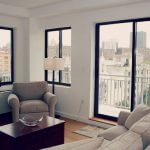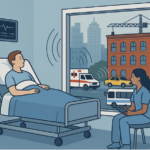As the calendar turns to 2024, New York City’s Local Law 97 (LL97) has officially entered full swing, ushering in a new era of carbon emission reduction and energy efficiency for buildings over 25,000 square feet. For property managers and resident managers, the time to make changes and ensure compliance with LL97 is now. Failure to meet the requirements of this ambitious law can result in significant penalties and fines, potentially exceeding a million dollars, depending on your building’s size.
In this article, we will explore the key aspects of LL97, its requirements, penalties for noncompliance, and how innovative solutions like CitiQuiet’s interior window systems can help property owners meet these standards affordably and effectively.
Understanding Local Law 97
Local Law 97, enacted in April 2019, is a groundbreaking initiative aimed at reducing greenhouse gas (GHG) emissions from buildings in New York City. It targets structures over 25,000 square feet, encompassing approximately 50,000 residential and commercial buildings across the city. The law sets strict limits on carbon emissions, with the enforcement of these limits beginning in January 2024.
To comply with LL97, building owners are required to reduce their annual carbon emissions to meet the newly proposed standards. While various methods can be employed to achieve compliance, the focus is on reducing energy consumption and emissions. For property managers and resident managers, understanding the implications of this law is crucial to avoid penalties and contribute to a greener New York City.
Penalties for Noncompliance
Local Law 97 imposes penalties for noncompliance to encourage building owners to take carbon emission reduction seriously. The penalties include:
- Carbon Emission Fines: Buildings emitting more carbon dioxide (CO2) than allowed by their emission cap will face fines. The fines are calculated at a rate of up to $268 per ton of CO2 exceeding the cap. These fines can quickly add up, making compliance essential.
- Failure to Report: Failure to submit the required yearly carbon emissions report will also result in penalties. Buildings will be fined at a rate of $0.50 per square foot per month for each month that the emissions are not reported. For larger buildings, this penalty can escalate rapidly, potentially reaching over a million dollars annually.
Enforcement of LL97
Enforcing Local Law 97 falls under the purview of the Department of Buildings (DOB) in New York City. The DOB has been responsible for disseminating information and overseeing the transition to LL97. However, a new office, the Office of Building Energy and Emissions Performance (BEEP), has been established within the DOB. BEEP will serve as the primary point of contact for compliance, penalties, and oversight once fully operational.
Meeting LL97 Compliance: Your Options
Meeting Local Law 97 compliance depends on several factors, including the age and condition of your building. Older structures may require more extensive and costly renovations, such as facade reconstruction, to improve energy efficiency and reduce emissions. In contrast, newer buildings may have more straightforward compliance options.
For property owners and managers seeking cost-effective and minimally intrusive solutions to meet LL97 requirements, CitiQuiet offers innovative interior window systems. These interior window inserts do not require the removal of existing windows, simplifying the retrofitting process. CitiQuiet’s interior window systems can reduce annual energy costs by an average of 20%, contributing significantly to LL97 compliance while also improving noise insulation within the building.
CitiQuiet Windows: Your Path to LL97 Compliance
With the deadline for LL97 compliance rapidly approaching, property owners, developers, and managers in New York City must take proactive steps to align with the law’s requirements and avoid substantial penalties. CitiQuiet’s interior window systems offer an affordable and practical solution to reduce yearly carbon emissions, enabling buildings to adhere to the proposed emission caps established by the city.
In addition to helping properties meet LL97 requirements, CitiQuiet’s soundproof windows deliver numerous benefits, including noise reduction, increased tenant satisfaction, cost savings, enhanced property value, and a more sustainable and eco-friendly building. By choosing CitiQuiet’s innovative solutions, property owners can ensure compliance with Local Law 97, contribute to a cleaner environment, and create a better living and working environment for residents and tenants.
Conclusion
The dawn of 2024 marks the official commencement of Local Law 97 in New York City, signaling a crucial juncture for property managers and resident managers. Compliance with LL97 is not just a legal requirement but an essential step towards reducing carbon emissions and creating a greener, more sustainable urban landscape. The penalties for noncompliance are significant, making it imperative for building owners to act now.
CitiQuiet’s interior window systems offer a practical, cost-effective, and tenant-friendly approach to LL97 compliance. By embracing innovative solutions like these, property owners can meet LL97 requirements, avoid penalties, and make a positive impact on both their bottom line and the environment.
The time to act is now, and CitiQuiet is here to help you on the journey towards a more energy-efficient and eco-conscious future in the heart of New York City. Contact CitiQuiet today to learn more about LL97, its penalties, compliance solutions, and how soundproof window inserts can make a difference for your property.



